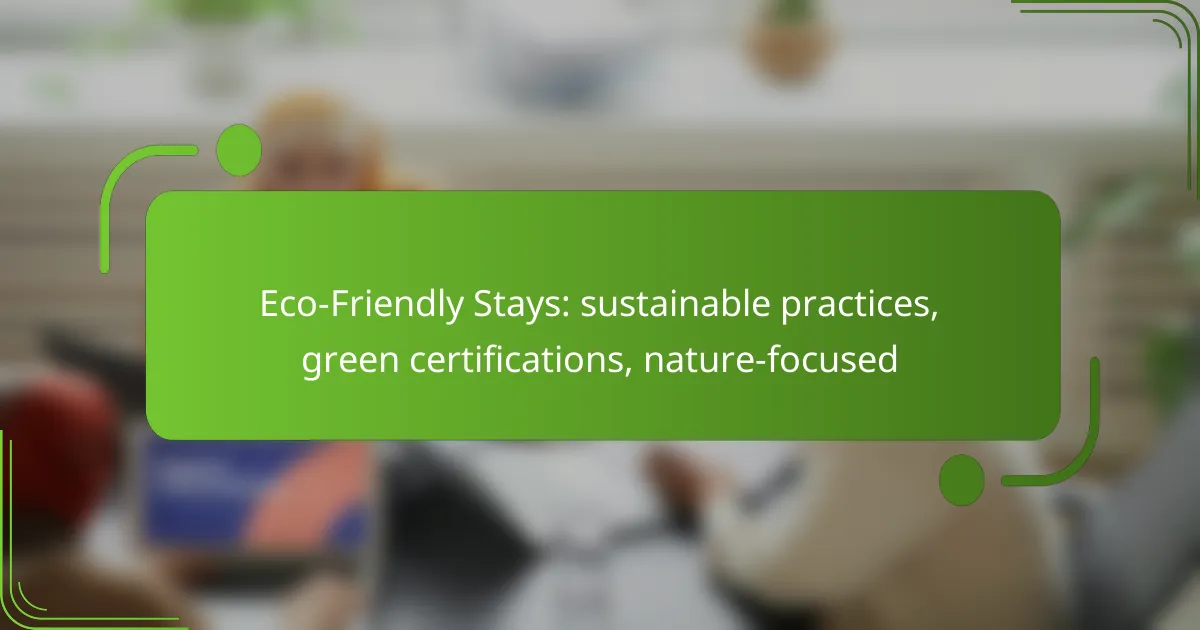Discover the best eco-friendly stays in Australia, where sustainability takes center stage through innovative green practices and energy-efficient solutions. These accommodations not only prioritize minimizing their environmental impact but also enhance guest experiences with nature-focused initiatives. Look for recognized green certifications that assure travelers of their commitment to responsible resource management and sustainable hospitality.

What are the best eco-friendly stays in Australia?
The best eco-friendly stays in Australia prioritize sustainability through green practices, energy efficiency, and nature-focused experiences. These accommodations often feature eco-certifications and initiatives that minimize their environmental impact while enhancing guest experiences.
Eco Retreats in Tasmania
Tasmania is home to several eco retreats that embrace the natural landscape while promoting sustainability. Many of these retreats utilize renewable energy sources, such as solar power, and offer organic meals sourced from local farms.
Notable options include the Pumphouse Point, which is set within a national park and emphasizes conservation, and the Freycinet Lodge, which integrates eco-friendly practices into its operations. Guests can enjoy activities like hiking and wildlife spotting, all while supporting sustainable tourism.
Green Hotels in Sydney
Sydney boasts a variety of green hotels that have received certifications like Green Star or EarthCheck. These hotels implement practices such as water conservation, waste reduction, and energy-efficient systems to minimize their ecological footprint.
For instance, the Ovolo Woolloomooloo features a zero-waste policy and offers locally sourced food options. The Sheraton Grand Sydney Hyde Park also focuses on sustainability with its green initiatives, making it a great choice for environmentally conscious travelers.
Sustainable Lodges in Queensland
Queensland’s sustainable lodges are designed to blend seamlessly with their natural surroundings, offering guests a unique experience while promoting environmental stewardship. Many lodges focus on preserving local ecosystems and wildlife.
Examples include the Eco Beach Resort, which uses solar energy and rainwater harvesting, and the Daintree Eco Lodge, where guests can explore the rainforest while supporting conservation efforts. These lodges often provide educational programs about the local environment and sustainable practices.

How do eco-friendly stays implement sustainable practices?
Eco-friendly stays implement sustainable practices by integrating systems and methods that minimize their environmental impact. These practices often focus on energy efficiency, water conservation, and waste reduction, creating a more sustainable experience for guests and the planet.
Energy-efficient systems
Energy-efficient systems are crucial for reducing the carbon footprint of eco-friendly accommodations. Many establishments utilize LED lighting, smart thermostats, and energy-efficient appliances to minimize energy consumption. For instance, hotels may install solar panels to harness renewable energy, significantly lowering reliance on fossil fuels.
When choosing an eco-friendly stay, look for properties that have received certifications like ENERGY STAR or LEED, which indicate adherence to strict energy efficiency standards. These certifications often ensure that the establishment has implemented best practices in energy management.
Water conservation methods
Water conservation methods are essential in eco-friendly stays to reduce overall water usage. Many properties install low-flow fixtures, such as showerheads and faucets, which can cut water consumption by a significant percentage. Additionally, some hotels have adopted greywater recycling systems to reuse water from sinks and showers for irrigation.
Guests can contribute to water conservation by opting for less frequent towel and linen changes, a common practice in many eco-conscious accommodations. This simple choice helps reduce laundry-related water and energy use.
Waste reduction strategies
Waste reduction strategies in eco-friendly stays focus on minimizing waste generation and promoting recycling. Many establishments implement composting programs for food waste and provide recycling bins throughout the property to encourage responsible disposal of materials. This approach not only reduces landfill contributions but also promotes a culture of sustainability among guests.
Travelers can support these efforts by being mindful of their waste, such as avoiding single-use plastics and participating in recycling initiatives offered by the accommodation. Some eco-friendly stays even offer incentives for guests who actively engage in waste reduction practices during their stay.

What green certifications should eco-friendly stays have?
Eco-friendly stays should ideally have recognized green certifications that demonstrate their commitment to sustainable practices. These certifications provide assurance to travelers that the accommodation meets specific environmental standards and engages in responsible management of resources.
Green Key certification
Green Key certification is an international eco-label awarded to hotels and other tourism establishments that meet stringent environmental criteria. To achieve this certification, properties must implement practices such as energy efficiency, water conservation, and waste management.
Travelers can look for the Green Key logo, which signifies that the establishment has undergone a rigorous evaluation process. Participating properties often engage in community initiatives and promote local culture, enhancing the overall guest experience.
EarthCheck certification
EarthCheck certification focuses on sustainable tourism practices and is recognized globally. It assesses the environmental performance of accommodations based on a range of criteria, including energy use, carbon emissions, and community engagement.
Establishments seeking EarthCheck certification must undergo regular audits and demonstrate continuous improvement in their sustainability efforts. This certification is particularly valuable for eco-conscious travelers who prioritize environmental responsibility in their lodging choices.
LEED certification
LEED (Leadership in Energy and Environmental Design) certification is a widely recognized standard for green building. While it is not exclusive to hotels, many eco-friendly stays pursue LEED certification to showcase their commitment to sustainable architecture and operational practices.
LEED-certified properties must meet specific criteria related to energy efficiency, water conservation, and indoor environmental quality. Travelers can benefit from staying in LEED-certified accommodations, as these properties often provide healthier environments and lower utility costs.

How to choose an eco-friendly stay in Australia?
To choose an eco-friendly stay in Australia, look for accommodations that prioritize sustainable practices, hold recognized green certifications, and offer easy access to natural environments. These factors ensure that your stay supports environmental conservation while providing a unique experience in nature.
Assessing sustainability practices
When assessing sustainability practices, consider how the accommodation minimizes its environmental impact. Look for features like energy-efficient appliances, water conservation systems, and waste reduction programs. Properties that utilize renewable energy sources, such as solar panels, are also strong candidates.
Additionally, inquire about their sourcing policies. Eco-friendly stays often support local businesses by using locally sourced food and materials, which reduces transportation emissions and promotes the local economy.
Evaluating green certifications
Green certifications can help you identify accommodations that meet specific environmental standards. In Australia, look for certifications such as EcoCert, Green Star, or the Sustainable Tourism Accreditation Program. These certifications indicate that the property adheres to rigorous sustainability practices.
Check for transparency in their certification process. Properties should be willing to share information about their sustainability efforts and the criteria they meet to obtain their certifications. This can provide peace of mind that your choice is genuinely eco-friendly.
Considering location and nature access
Choosing a location that offers easy access to natural attractions enhances your eco-friendly experience. Look for stays near national parks, beaches, or nature reserves, which encourage outdoor activities and appreciation of the environment. Proximity to these areas can also reduce the need for transportation, further minimizing your carbon footprint.
Consider the type of activities available in the area. Eco-friendly stays often provide opportunities for hiking, wildlife watching, and other nature-focused experiences. Engaging with the local environment not only enriches your stay but also fosters a deeper connection to the natural world.

What are the benefits of staying at eco-friendly accommodations?
Staying at eco-friendly accommodations offers numerous advantages, including a reduced carbon footprint, support for local economies, and an overall enhanced travel experience. These benefits not only contribute to environmental sustainability but also enrich your connection to the destination.
Reduced environmental impact
Eco-friendly accommodations implement sustainable practices that minimize their environmental footprint. This can include energy-efficient appliances, water conservation measures, and waste reduction strategies. By choosing these options, travelers help decrease pollution and resource depletion.
Many eco-friendly hotels are certified by recognized organizations, ensuring they meet specific environmental standards. Look for certifications like LEED or Green Key, which indicate a commitment to sustainability.
Support for local communities
Staying at eco-friendly accommodations often means supporting local businesses and communities. Many of these establishments source food and materials locally, which helps stimulate the regional economy. This practice not only fosters community growth but also enhances the authenticity of your travel experience.
When you choose eco-friendly lodging, you are more likely to engage with local culture and traditions, creating a more meaningful connection to the area. This can include participating in community-led tours or dining at locally-owned restaurants.
Enhanced guest experience
Eco-friendly accommodations frequently offer unique experiences that go beyond standard hotel stays. Many focus on creating a serene environment, often surrounded by nature, which can enhance relaxation and well-being. This connection to the natural world can lead to a more fulfilling travel experience.
Guests may also find that eco-friendly hotels provide personalized services, such as wellness programs or outdoor activities, that cater to environmentally conscious travelers. Engaging in these activities can deepen your appreciation for the local ecosystem and promote sustainable tourism practices.
